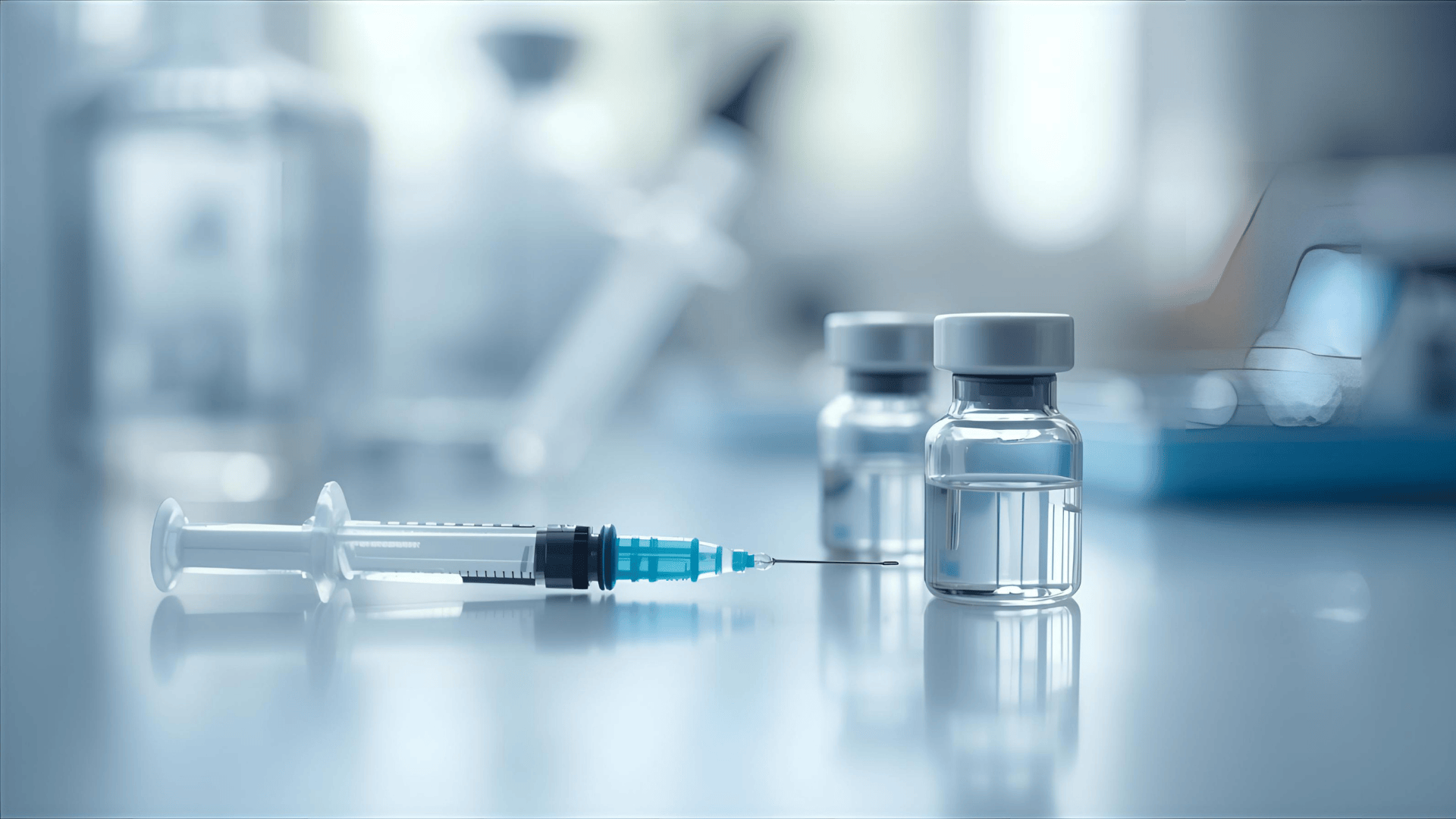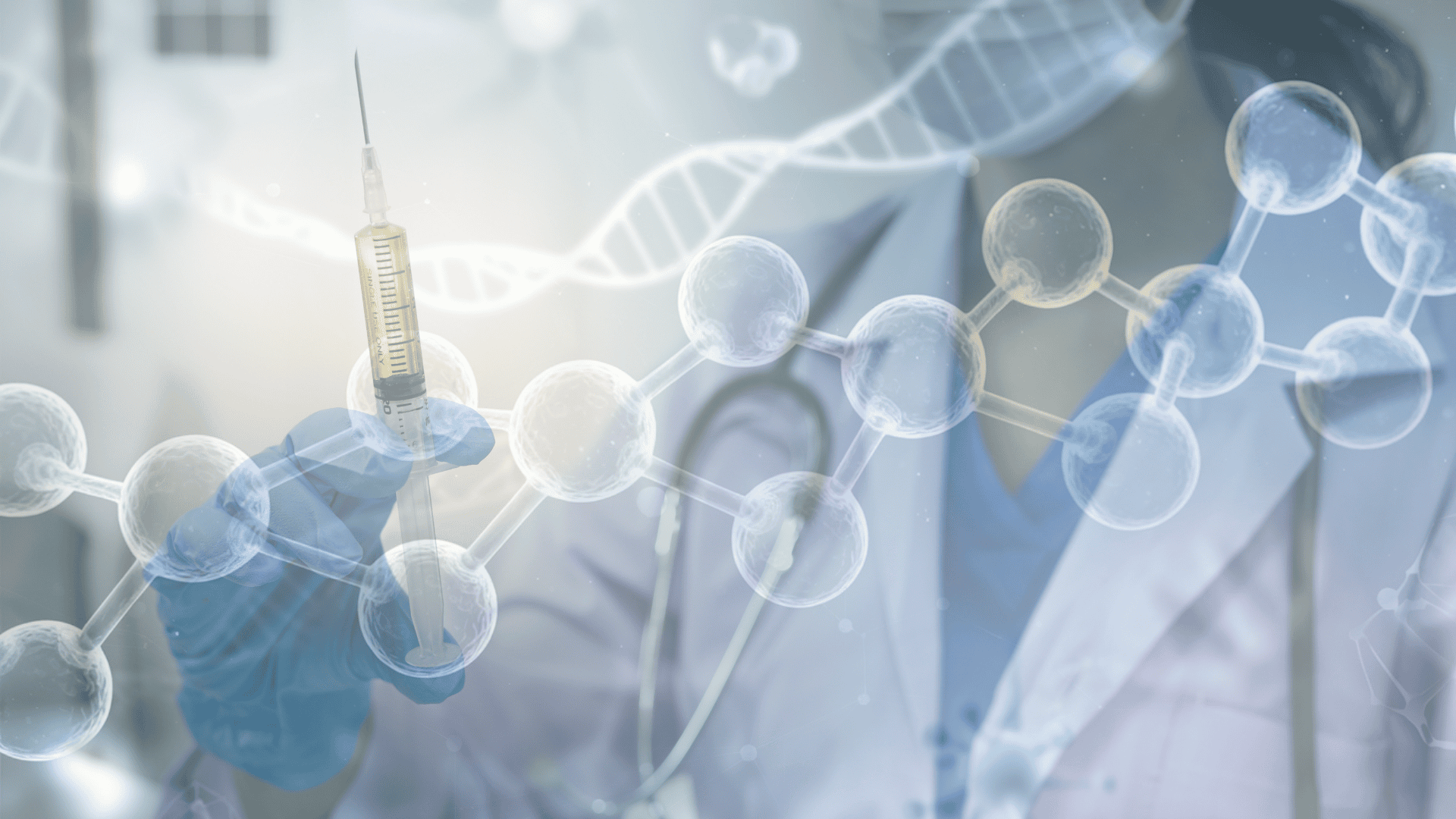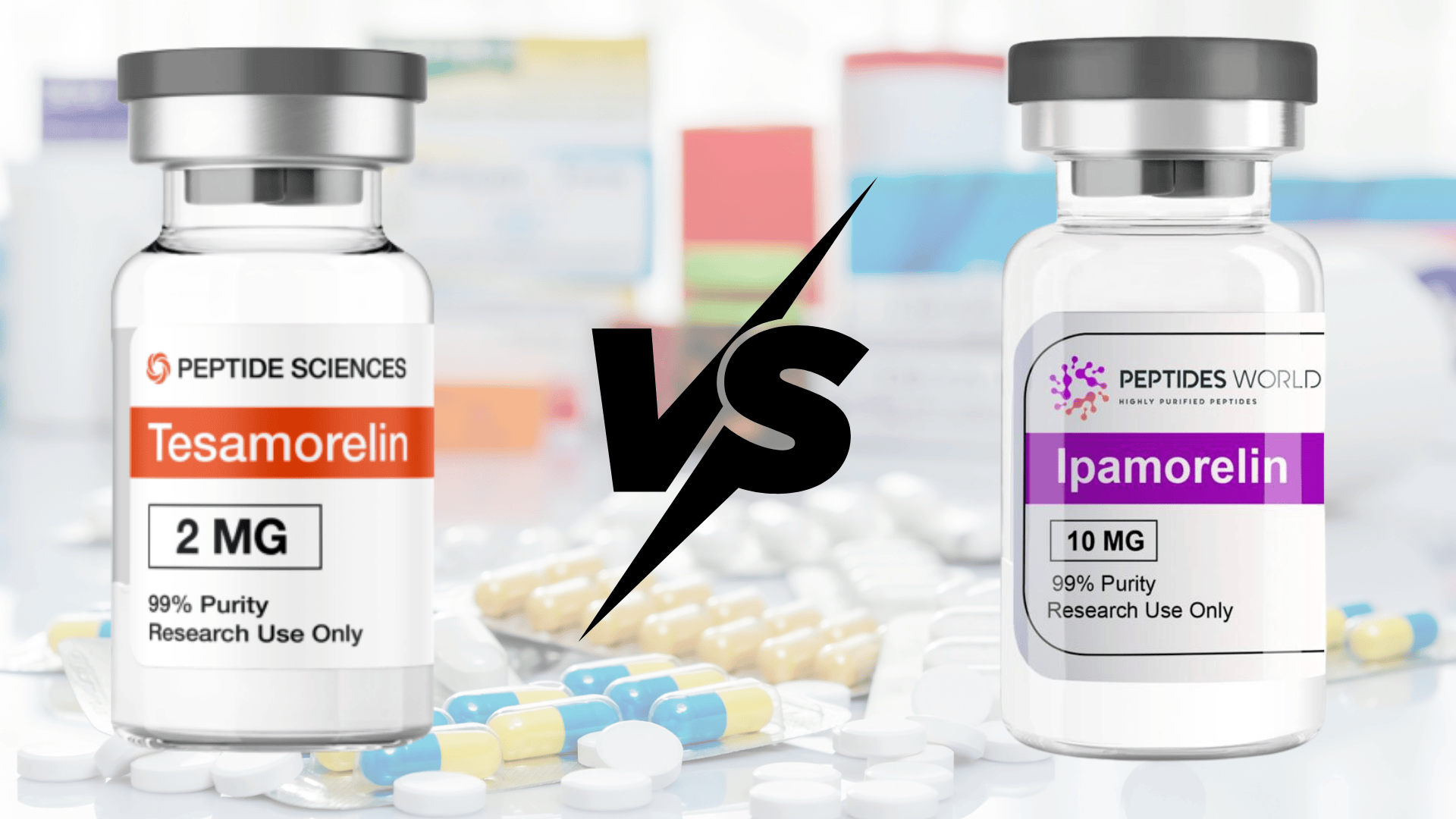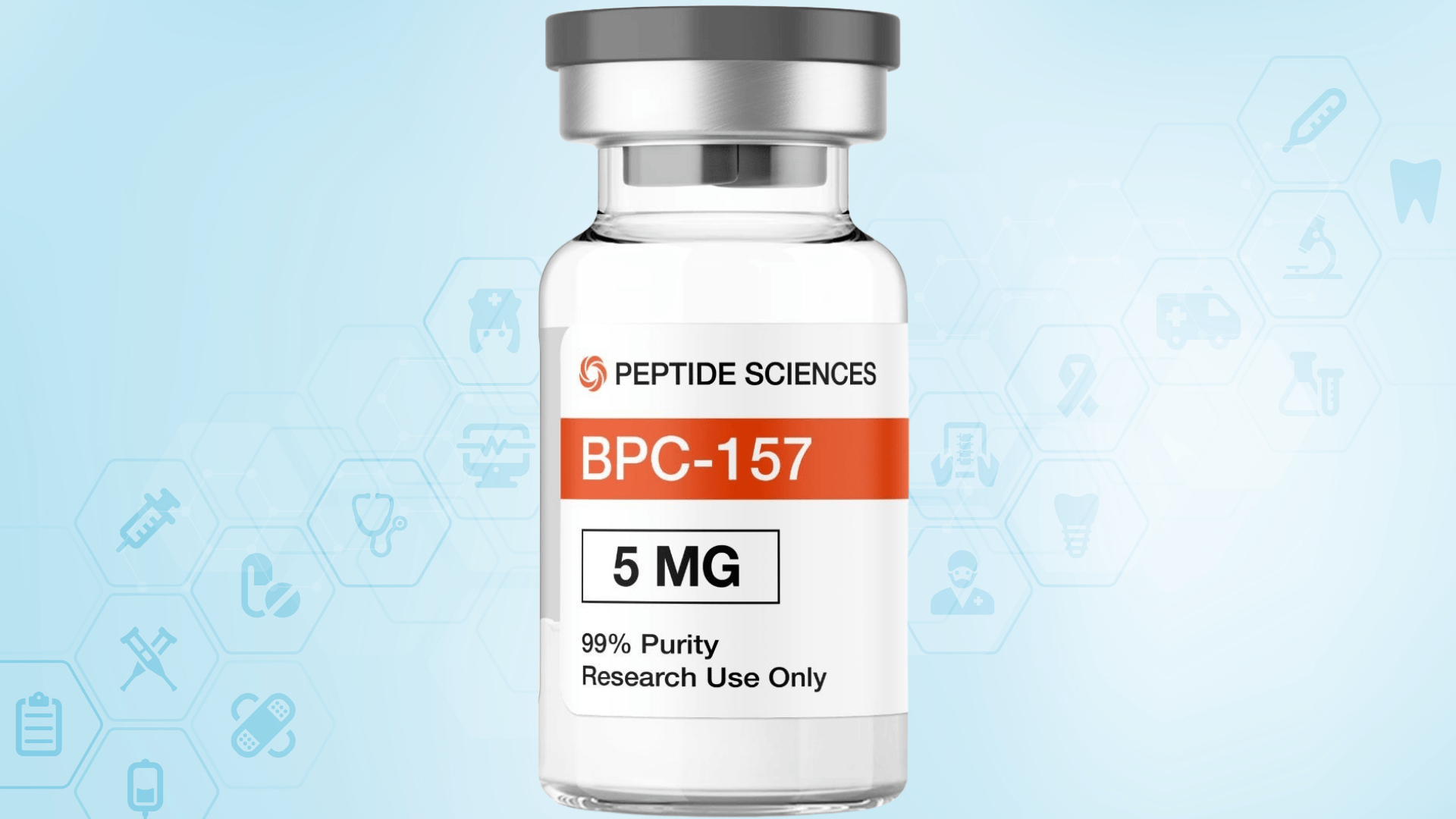Peptide therapy is changing how doctors approach healing, aging, and performance.
These tiny chains of amino acids work like messengers in your body. They tell your cells to repair tissue, build muscle, or balance hormones.
But here’s what makes peptides different from regular supplements: they work fast and precisely.
While pills get broken down in your stomach, injections deliver peptides straight where they’re needed.
Athletes use them to recover faster. Others want younger-looking skin. Some people need help with chronic pain or low energy.
In this guide, you’ll learn what peptide injections are, how they work, and which types treat specific conditions.
We’ll cover the benefits, medical uses, safety concerns, and how to get started with proper medical guidance.
What Are Peptide Injections?
Peptide injections are a form of treatment in which specific chains of amino acids are delivered directly into the body through a needle.
Unlike oral supplements, which must pass through your digestive system, injections deliver peptides directly into your bloodstream or muscle tissue.
This method ensures better absorption and faster results. Your body then uses these peptides to trigger specific cellular responses, such as tissue repair, hormone production, or immune support.
Compared to topical creams that only address surface-level issues, injections target deeper tissues and organs. Oral peptides often break down in your stomach before they can work effectively.
That’s why many doctors prefer injections for therapeutic purposes. They’re more reliable and potent.
Types of Peptides
Not all peptides function in the same way; your body utilizes different types for specific tasks. Let’s break down the main categories and what each one does.
- Structural Peptides – These peptides, like collagen and elastin, form the building blocks of your skin, joints, and connective tissues, keeping them strong and flexible.
- Hormonal Peptides – Peptides such as insulin and glucagon act as chemical messengers that regulate critical body functions like blood sugar levels and metabolism.
- Neuropeptides – Brain-active peptides, including endorphins and oxytocin, transmit signals between nerve cells and influence mood, pain response, and social bonding.
- Antimicrobial Peptides – Your body’s natural defenders, like defensins, fight off bacteria, viruses, and fungi to protect against infections.
- Enzyme Inhibitor Peptides – These regulatory peptides control enzyme activity in your body, with ACE inhibitors helping manage blood pressure and cardiovascular health.
- Cell Signaling Peptides – Growth factors and cytokines direct cell communication, growth, and repair processes throughout your body’s tissues and organs.
Key Benefits of Peptide Therapy
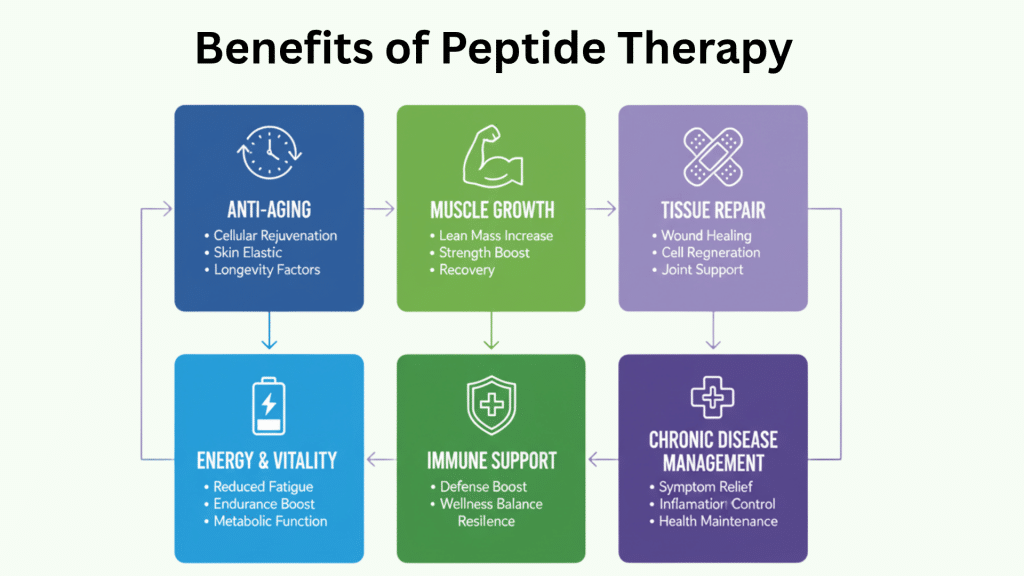
Now that you know the different types of peptides, let’s look at why so many people are turning to peptide therapy for real health improvements.
1. Anti-aging & Skin Rejuvenation
Peptides stimulate collagen production in your skin, reducing wrinkles and fine lines naturally. They help restore firmness and improve overall skin texture.
Many people notice visible improvements in skin tone and hydration within weeks of starting treatment.
2. Muscle Growth, Strength & Fat Loss
Certain peptides boost growth hormone levels, which helps build lean muscle mass faster. They also accelerate fat burning by enhancing your metabolism.
Athletes and fitness enthusiasts use them to enhance performance and achieve better body composition.
3. Tissue Repair & Recovery from Injuries
Peptides like BPC-157 accelerate healing in damaged muscles, tendons, and ligaments. They reduce inflammation and promote faster recovery after workouts or injuries. This makes them popular among people recovering from sports injuries or chronic pain conditions.
4. Hormonal Balance & Energy Support
Peptide therapy can help regulate hormone production, especially as you age.
This leads to improved energy levels, better sleep quality, and a more positive mood. Many users report feeling more vibrant and mentally sharp throughout the day.
5. Immune System Enhancement
Specific peptides enhance your immune response by supporting the function of white blood cells. They help your body fight infections more effectively.
Thymosin peptides, for example, are known for their immune-boosting properties.
6. Potential Role in Chronic Disease Management
Research suggests that peptides may help manage conditions such as diabetes, heart disease, and autoimmune disorders.
They work by targeting specific pathways involved in the progression of disease. Although still under study, early results show promise for long-term health benefits.
Safety and Side Effects of Peptide Therapy
Like any medical treatment, peptide therapy comes with considerations that you should be aware of. Here’s what to expect and how to stay safe.
| Aspect | Details |
|---|---|
| Common Side Effects | Redness, swelling, or mild pain at injection sites; occasional headaches; temporary water retention; slight nausea; flushing or tingling sensations that usually fade within days |
| Potential Risks with Misuse or Unregulated Products | Contaminated products can cause infections or allergic reactions; incorrect dosing may disrupt hormone balance; fake peptides offer no benefits and waste money; unknown ingredients pose serious health dangers |
| Importance of Medical Supervision and Proper Dosing | Doctors monitor your response and adjust doses safely; regular lab tests prevent hormonal imbalances; professional guidance reduces side effects; proper protocols ensure you get real therapeutic benefits without unnecessary risks |
Medical Applications of Peptide Injections
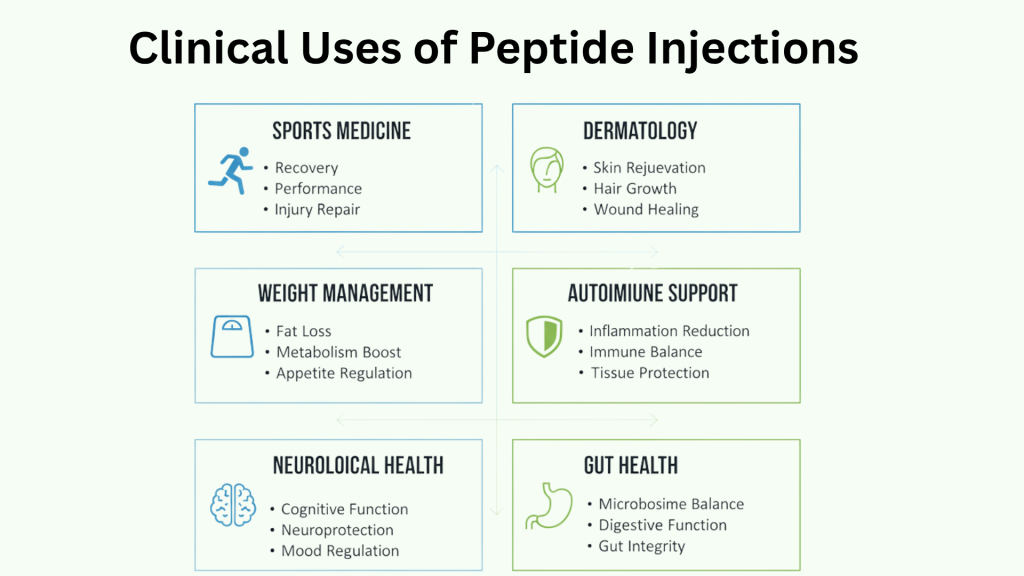
Beyond general wellness, peptides are making a real impact in clinical settings. Here’s how doctors are using them to treat specific medical conditions.
1. Sports Medicine & Athletic Recovery
Doctors use peptides to help athletes recover faster from intense training and injuries. They reduce muscle soreness and speed up tissue repair after strains or tears.
Many sports medicine clinics now incorporate peptide therapy into their treatment protocols to enhance optimal performance.
2. Cosmetic Dermatology (Wrinkles, Skin Elasticity)
Dermatologists inject specific peptides to reduce signs of aging and improve skin quality.
These treatments boost collagen synthesis, tighten loose skin, and minimize wrinkles. Results typically appear within 4-6 weeks and continue to improve over time.
3. Weight Management & Metabolism Support
Peptides can regulate appetite hormones and increase fat-burning capacity in your body. They help maintain lean muscle while promoting healthy weight loss.
Medical weight loss programs often combine peptide therapy with nutrition and exercise plans.
4. Autoimmune Conditions & Immune Regulation
Certain peptides help balance overactive immune responses in conditions like rheumatoid arthritis and lupus.
They reduce inflammation without suppressing your entire immune system. This targeted approach offers relief with fewer side effects than traditional medications.
5. Neurological Health (Cognitive Support, Neuroprotection)
Neuropeptides support brain function by protecting nerve cells from damage and promoting their health and longevity.
They may improve memory, focus, and mental clarity in aging adults. Research is exploring their potential in conditions like Alzheimer’s and Parkinson’s disease.
6. Gut Health & Inflammation Control
Peptides like BPC-157 aid in healing a damaged intestinal lining and reducing gut inflammation.
They’re used to treat conditions such as IBS, leaky gut, and inflammatory bowel disease. Many patients experience relief from digestive symptoms within weeks of treatment.
Who Can Benefit from Peptide Injections?
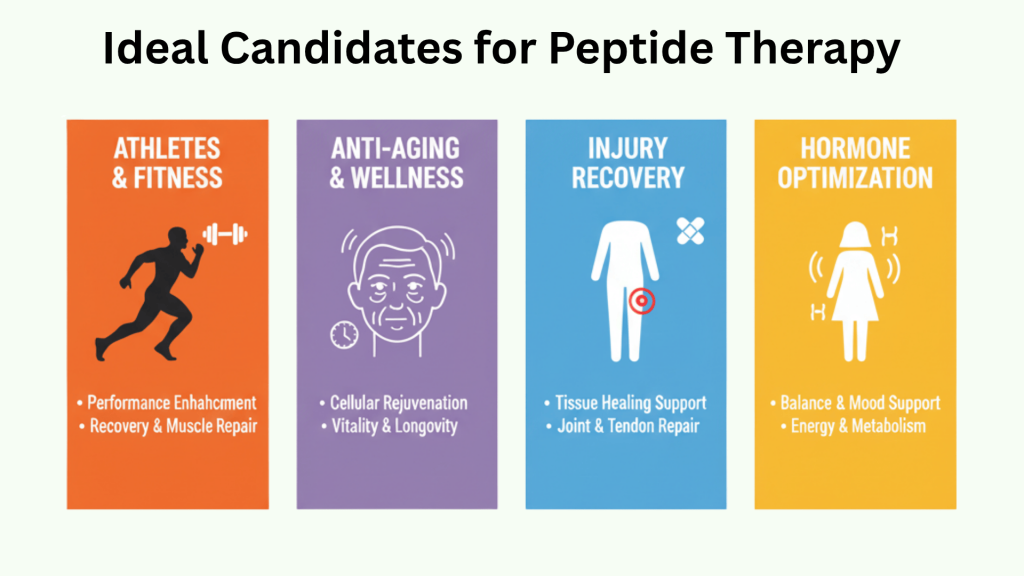
Peptide therapy isn’t one-size-fits-all. Certain groups of people see the most significant results from this treatment approach.
- Athletes and Fitness Enthusiasts: Individuals who train regularly can utilize peptides to build muscle more quickly, recover faster between workouts, and reduce exercise-related injuries.
- Individuals seeking anti-aging solutions find peptide therapy effective for addressing age-related concerns, including reducing wrinkles and improving skin firmness, while maintaining youthful energy levels.
- Patients with Chronic Injuries or Inflammation: Individuals experiencing ongoing joint pain, tendon damage, or inflammatory conditions can achieve faster healing and lasting pain relief through peptide treatment.
- People Exploring Hormone Optimization: Individuals experiencing hormonal imbalances, low energy, poor sleep, or declining vitality may benefit from peptides that support natural hormone production.
Legal and Regulatory ConsiderationsThe FDA has approved certain peptides for specific medical uses, but many therapeutic peptides exist in a gray area. |
How to Get Started with Peptide Therapy?
Starting peptide therapy begins with consulting a qualified healthcare professional who specializes in this treatment.
Your doctor will review your medical history and discuss your health goals with you.
They’ll order blood tests and other lab work to understand your current hormone levels and overall health status.
Based on these results, they create a personalized protocol that matches your specific needs.
During therapy sessions, you’ll receive injections at scheduled intervals, some of which are weekly, while others are more frequent. Your provider will teach you proper injection techniques if you’re doing them at home.
They’ll also monitor your progress through follow-up appointments and adjust dosages as needed. Most people start noticing benefits within 2-4 weeks, though full results may take several months.
Final Thoughts
Peptide injections offer real solutions for muscle recovery, anti-aging, tissue repair, and hormonal balance.
They work faster than oral supplements because they go directly into your bloodstream.
From athletes recovering from injuries to individuals combating signs of aging, peptides offer targeted benefits supported by medical research.
But safety matters most. Always work with a licensed healthcare provider who sources peptides from reputable pharmacies.
Proper testing, dosing, and monitoring protect you from risks while maximizing results.
The future of regenerative medicine is here, and peptides are leading the way.
Ready to explore peptide therapy? Consult with a qualified medical professional today to determine if this treatment aligns with your health goals.
Your body deserves science-backed care that actually works.

